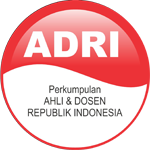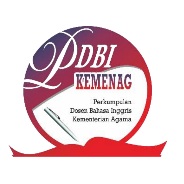Effective Commands to Overcome Students with Disruptive Behavior in the Classroom
Abstract
This study was conducted which aimed at investigating effective commands used by teachers in TK Aura Sukma Insani to overcome disruptive behaviors by identifying: 1) the types of disruptive behavior done by students, 2) the types of command used by the teachers, and 3) the commands which are effective based on students’ responses. Teachers and students from A2, A1, and toddler class were the subject of the study while disruptive behaviors done by the students and commands used by the teacher were the object of the study. All the data were gathered through observation, questionnaire, and interview. The result revealed that there were 145 disruptive behaviors found and seven type of commands used by the teachers including question command, regular command, indirect command, don’t command, stop command, negative command and other command. Moreover, most of the commands given were effective based on the effects on students’ behavior. From the result, it could be concluded that regular command and other command were the most effective types of command used by teachers to overcome disruptive behaviors because the commands related were clear, understandable, and simple. Therefore, the student were easy to understand what the teachers intended.
Keywords
Full Text:
PDFReferences
Ali, A., & Gracey, D. (2013). Dealing with Student Disruptive Behavior in the Classroom – A Case Example of the Coordination between Faculty and Assistant Dean for Academics. Issue in Informing Science and Information Technology, 10, 1–15. Retrieved from http://iisit.org/Vol10/IISITv10p001-015Ali0124.pdf.
Apriani, E. (2016). A New Literacy: The Role of Technology to Develop Student’s Character. Ta’dib:Journal of Islamic Education (Jurnal Pendidikan Islam), 21(1), 59 - 72. https://doi.org/https://doi.org/10.19109/tjie.v21i1.742.
Apriani, E., Supardan, D., Sartika, E., Suparjo, S., & Hakim, I. N. (2019). UTILIZING ICT TO DEVELOP STUDENT’S LANGUAGE ETHIC AT ISLAMIC UNIVERSITY. POTENSIA: Jurnal Kependidikan Islam, 5(1), 1-14.
Bertsch, K. M., Houlihan, D., Lenz, M. A., & Patte, C. A. (2009). Teachers’ Commands and Their Role in Preschool Classrooms. Electronic Journal of Research in Education Psychology, 7(17), 133–162.
Bowen, J., Jenson, W., & Clark, E. (2004). School-based interventions for students with behavior problems. New York: Springer Science+Business Media. https://doi.org/10.1007/978-1-4419-9102-7
Ghazi, S. R., Shahzada, G., Tariq, M., & Khan, A. Q. (2013). Types and Causes of Students’ Disruptive Behavior in Classroom at Secondary Level in Khyber Pakhtunkhwa, Pakistan. American Journal of Education Research, 1(9), 350–354. https://doi.org/10.12691/education-1-9-1
Herbert, M., & Wookey, J. (2004). Managing children’s disruptive behavior: a guide for practitioners working with parents and foster parents. London: British Library Cataloguing in Publication Data.
Israwati. (2017). Pengelolaan Ruang Kelas Pendidikan Anak Usia Dini Pada Kelompok B di Taman Kanak-Kanak. Jurnal Serambi Ilmu, 119–124. Retrieved from http://ojs.serambimekkah.ac.id/index.php/serambi-ilmu/article/download/453/415
Karakaya, E. G., & Tufan, M. (2018). Social Skills, Problem Behaviors and Classroom Management in Inclusive Preschool Settings. Journal of Education and Training Studies, 6(5), 123–134. https://doi.org/10.11114/jets.v6i5.3076
Kemendikbud. (2015). Peraturan Menteri Pendidikan dan Kebudayaan Republik Indonesia Nomor 84 Tahun 2014 Tentang Pendirian Satuan Pendidikan Anak Usia Dini. Retrieved from http://simpuh.kemenag.go.id/regulasi/permendikbud_84_14.pdf
Kesselring, T., & Müller, U. (2011). The Concept of Egocentrism in Context of Piaget’s Theory. New Ideas in Psychology, 29(3), 327–345. https://doi.org/10.1016/j.newideapsych.2010.03.008
Knoster, T. (2014). The teacher’s pocket guide for effective classroom management (2nd ed.). Retrieved from http://archive.brookespublishing.com/documents/knoster-classroom-management.pdf
Lentini, R., Vaughn, B. J., & Fox, L. (2005). Teaching tools for young children with challenging behavior. Retrieved from https://vkrp.virginia.edu/content/pdfs/3. Communication is key.pdf
Lopes, J., Silva, E., Oliveira, C., Sass, D., & Martin, N. (2017). Teacher’s Classroom Management Behavior and Students’ Classroom Misbehavior: A Study with 5th through 9th - Grade Students. Electronic Journal of Research in Education Psychology, 15(3), 467–490. Retrieved from https://www.researchgate.net/profile/Joao_Lopes4/publication/323171089_Teacher%27s_Classroom_Management_Behavior_and_Students%27_Classroom_Misbehavior_A_Study_with_5th_through_9th_-_Grade_Students/links/5aba15d845851515f5a13514/Teachers-Classroom-Management-Behavior-and-Students-Classroom-Misbehavior-A-Study-with-5th-through-9th-Grade-Students.pdf?origin=publication_detail
Martella, R., & Merchand-Martella, N. (2015). Improving Classroom Behavior Through Effective Instruction: An Illustrative Program Example Using SRA FLEX Literacy. Education and Treatment of Children, 38(2), 241–272. Retrieved from http://info.mheducation.com/rs/128-SJW-347/images/Improving_Classroom_Behavior_Through_Effective_Instruction_An_Illustrative_Program_Example_Using_SRA_FLEX_Literacy.pdf
Matheson, A. S., & Shriver, M. D. (2005). Training Teachers to Give Effective Commands: Effects on Student Compliance and Academic Behaviors. School Psychology Review, 32(2). Retrieved from https://www.researchgate.net/profile/Andrea_Matheson/publication/282690438_Training_Teachers_to_Give_Effective_Commands_Effects_on_Student_Compliance_and_Academic_Behaviors/links/56d0625b08aeb52500cd720f/Training-Teachers-to-Give-Effective-Commands-Effects-on-Student-Compliance-and-Academic-Behaviors.pdf?origin=publication_detail
Miles, M. B., & Huberman, A. M. (1994). Qualitative data analysis (2nd ed.). California: Sage Publications. Retrieved from https://vivauniversity.files.wordpress.com/2013/11/milesandhuberman1994.pdf
Musyarofah. (2017). Pengembangan Aspek Sosial Anak Usia Dini di Taman Kanak Kanak Aba IV Mangli Jember Tahun 2016. Interdisciplinary Journal of Communication, 2(1), 99–121. Retrieved from https://doi.org/10.18326/inject.v2i1.99-122
Oliver, R. M., Wehby, J. H., & Reschly, D. J. (2011). Teacher classroom management practices: effects on disruptive or aggressive student behavior. USA: The Campbell Collaboration. https://doi.org/10.4073/csr.2011.4
Şanlı, Ö. (2019). An Evaluation of the Teachers’ Classroom Management Problems. Academic Journals, 14(8), 282–292. https://doi.org/10.5897/ERR2019.3712
Sun, R. C. F., & Shek, D. T. L. (2012). Student Classroom Misbehavior: An Exploratory Study Based on Teachers’ Perceptions. The Scientific World Journal, 1–8. https://doi.org/10.1100/2012/208907
Tiwari, G., & Panwar, H. (2014). A Study on the Classroom Behaviour Problems at Secondary Level. American Research Thoughts, 1(1), 514–536. Retrieved from https://www.researchgate.net/profile/Gyanendra_Tiwari/publication/269710972_A_Study_on_the_classroom_behaviour_Problems_at_secondary_level/links/5495037e0cf2ec1337581e04/A-Study-on-the-classroom-behaviour-Problems-at-secondary-level.pdf?origin=publication_detail
Yusoff, W., & Mansor, N. (2016). The Effectiveness of Strategies Used by Teachers to Manage Disruptivw Classroom Behaviors: A Case Study at a Religious School in Rawang, Selangor. Journal of Educational Studies, 1(4), 133–150.
DOI: http://dx.doi.org/10.29240/ef.v4i2.1822
Refbacks
- There are currently no refbacks.
Copyright (c) 2020 Luh Kade Diana Kusumadewi, Luh Diah Surya Adnyani, Ni Putu Astiti Pratiwi

This work is licensed under a Creative Commons Attribution-NonCommercial-ShareAlike 4.0 International License.
INDEXED BY:
 This work is licensed under a Creative Commons Attribution-NonCommercial-ShareAlike 4.0 International License
This work is licensed under a Creative Commons Attribution-NonCommercial-ShareAlike 4.0 International License
@ ENGLISH FRANCA : Academic Journal of English Language and Education
Jl. Dr. AK Gani No 1 Dusun Curup, Rejang Lebong Regency, Bengkulu Province, Indonesia, 39119.
Dr. Eka Apriani, M.Pd., email: efranca@iaincurup.ac.id, eka.apriani@iaincurup.ac.id.




.png)












